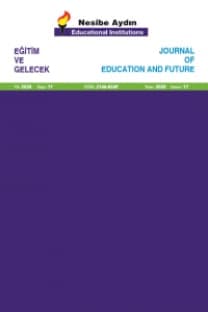Öğretmen Adaylarının Tercih Ettikleri Aktif Öğrenme Yöntem ve Teknikler
Bu çalışmanın amacı, öğretmen adaylarının tercih ettiği aktif öğrenme yöntem/tekniklerini belirlemektir. Tarama modeline göre gerçekleştirilen çalışmanın katılımcılarını 2017-2018 akademik yılı bahar yarıyılında Kastamonu Üniversitesi’nde pedagojik formasyon eğitimi almış olan öğretmen adayları (n=266) oluşturmaktadır. Çalışmada veri toplama aracı olarak araştırmacılar tarafından geliştirilen anket formu kullanılmıştır. Anket formunda öğretmen adaylarının tercih ettikleri aktif öğrenme yöntem/tekniklerin belirlenebilmesi için 5’li likert tipi maddelere yer verilmiştir. Hazırlanan anketin ön uygulaması yapılmış, cronbach alpha değeri .86 olarak bulunmuştur. Anket üzerinde düzenlemeler yapılarak ölçeğin son hali 25 maddeden oluşacak şekilde hazırlanmıştır. Araştırma sonunda elde edilen verilerin analizinde yüzde, frekans ve betimsel analiz kullanılmıştır. Araştırmada elde edilen verilere göre öğretmen adayları tarafından en fazla tercih edilen aktif öğrenme yöntem ve tekniklerinin; soru-cevap, beyin fırtınası ve problem çözme olduğu belirlenirken dedikodu, mahkeme ve vızıltının en az tercih edilen yöntem ve teknikler olduğu tespit edilmiştir.
Active Learning Methods and Techniques Preferred by Teacher Candidates
The aim of this study is to determine the active learning methods and techniques that teachercandidates prefer. The study was conducted in accordance with scanning method. The participantsof the study were consisted of teacher candidates (n=266) who were received pedagogical formationeducation in Kastamonu University at 2017-2018 spring term. All of the participants had taken thelessons of “Teaching Principles and Methods” and “Special Teaching Methods”. The survey formdeveloped by the researchers was used as data collection tool in the study. The survey form wasformed as ranking scale by consulting the field specialists’ opinions. Accordingly, to state the activelearning methods and techniques preferred by teacher candidates 5 Likert-type items, from alwaysto never, were used in the scale. According to the pre-implementation results the Cronbach’s alphavalue of the form was calculated .86 and after the revision of the scale, final form was consisted of25 items. Percentage, frequency and descriptive analysis were used for the analysis of the dataobtained from teacher candidates’ opinions. According to the findings of the study, it was concludedthat question-answer, brainstorming and problem-solving were the most preferred active learningmethods and techniques while gossip, court and buzz were the least preferred ones.
___
- Aydede, M. N., Çağlayan, Ç., Matyar, F., & Gülnaz, O. (2006). Fen ve teknoloji öğretmenlerinin kullandıkları öğretim yöntem ve tekniklerine ilişkin görüşlerinin değerlendirilmesi. [Evaluating the viesws of science and technology teachers about teaching methods and techniques they use].Çukurova Üniversitesi Eğitim Fakültesi Dergisi [Çukurova University Journal of Faculty of Education], 3(32), 24-33.
- Aydın, A. (2003). Gelişim ve öğrenme psikolojisi [Psychology of development and learning]. İstanbul: Alfa Publishing.
- Büyükkaragöz, S. S., & Çivi, C. (1999). Genel öğretim metotları [General teaching methods]. İstanbul:Beta Publishing.
- Demirel, Ö. & Ün, K. (1987). Eğitim terimleri[Education terms]. Ankara: Şafak Publishing.
- Demirel, Ö. (2003). Türkçe Öğretimi [Teaching Turkish Language]. Ankara: Pegem Publishing.
- Demirel, Ö. (2006).Ögretimde planlama ve değerlendirme öğretme sanatı [The art of teaching planning and evaluation in teaching]. (10st Ed.). Ankara: PegemA Publishing.
- Erden, M. (1997). Sosyal bilgiler öğretimi [Teaching social studies], Ankara: Alkım Publishing.
- Ergun, M. (1999). Öğretmenlik mesleğine giriş [Introdustion to teaching profession]. Ankara: Ocak Publinshing.
- Halat, E. et. al. (2006). Matematik öğretimi [Teaching Mathematics]. İstanbul: Lisans Publishing.
- Küçükahmet, L. (2000). Öğretimde planlama ve değerlendirme [Planning and Evaluating in Teaching]. Ankara: Nobel Publishing.
- Oğuzkan, F. (1989). Orta dereceli okullarda öğretim: Amaç, ilke, yöntem ve teknikler [Teaching in secondary schools: Objectives, principles, methods and techniques]. Ankara: Emel Publishing.
- Saracaloğlu, A. S. (2003). Öğretimde planlama ve değerlendirme [Teaching planning and evaluation in teaching]. Aydın: Adnan Menderes University.
- Snowman, J. (1986). Learning tactics and strategies. (Editors: Phye, G.D. and Andre, T.). Cognitive classroom learning: Understanding, teaching and problem-solving. New York: AcademicPres, Inc.
- Şahin, Ç. (2004). İlköğretim okullarında görev yapan öğretmenlerin kullandıkları öğretim stratejileri [Teaching strategies used by teachers working in primary schools]. İnönü Üniversitesi Eğitim Fakültesi Dergisi [Inönü University Journal of Faculty of Education], 5(8), 12-19.
- Tan, Ş. (2007). Öğretim ilke ve yöntemleri [Teaching principles and methods]. Ankara: PegemA Publishing
- ISSN: 2146-8249
- Yayın Aralığı: Yılda 2 Sayı
- Başlangıç: 2012
- Yayıncı: Nesibe Aydın Eğitim Kurumları
Sayıdaki Diğer Makaleler
Tuğba Cevriye ÖZKARAL, Mustafa YAVUZ
Öğretmen Adaylarının Tercih Ettikleri Aktif Öğrenme Yöntem ve Teknikler
“Müze Eğitimiyle Tanışmayan Öğrenci Kalmasın” Müzede Gönüllü Eğitim Programı Uygulaması
Zekiye ÇILDIR GÖKASLAN, Ceren KARADENİZ, Alper YETKİNER
Ayşegül BAYRAKTAR, Seher YALÇIN
Dijital Okuryazarlık Becerileri ve E-Öğrenmeye Yönelik Tutum
Gözde SEZEN GÜLTEKİN, Nazire Burçin HAMUTOĞLU, Merve SAVAŞÇI
Öğretmen Adaylarının Demokrasiye İlişkin Algıları
Pınar BAĞÇELİ KAHRAMAN, Gönül ONUR SEZER
Tematik Bir Çerçeveden Bilişsel Yapılar ve Kavram Yanılgıları: Kimyasal Bağlar Örneği
Ayhan YILMAZ, Şenol ŞEN, Lütfiye VAROĞLU
Öğrencilerin Etkili Öğrenmelerinde Duyuşsal ve Motivasyon Engelleri
